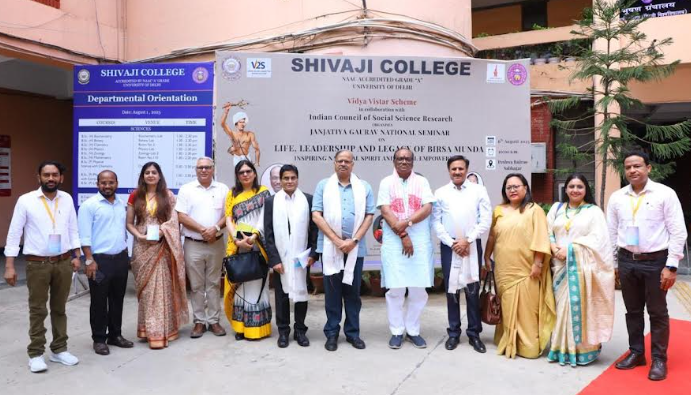National Seminar on “Life, Leadership and Legacy of Birsa Munda” Inspires National Spirit and Tribal Empowerment at Shivaji College

New Delhi, Aug 11: The Janjatiya Gaurav National Seminar on “Life, Leadership and Legacy of Birsa Munda: Inspiring National Spirit and Tribal Empowerment” was successfully organized by Shivaji College, University of Delhi, under the Vidya Vistar Scheme, with sponsorship from the Indian Council of Social Science Research (ICSSR).
The event was graced by the presence of Hon’ble Shri Durgadas Uikey, Union Minister of State for Tribal Affairs, as Chief Guest, and Professor K. Ratnabali, Dean, Academic Affairs, University of Delhi as Guest of Honour. The event, brought together eminent scholars, policymakers, and students to honour the unparalleled legacy of Birsa Munda and his enduring message of indigenous rights, ecological justice, and national pride.
Professor Virender Bhardwaj, Principal of Shivaji College, delivered the welcome address, emphasizing the significance of Birsa Munda’s revolutionary call for “Ulgulan” (rebellion) not only as resistance to colonial exploitation but as an assertion of tribal dignity, indigenous culture and ecological harmony.
Hon’ble Shri Durgadas Uikey, Union Minister of State for Tribal Affairs, as Chief Guest, lauded the seminar’s theme and highlighted how the government is committed to tribal empowerment and recognition of Janjatiya heritage. He reflected on the declaration of 15th November as Janjatiya Gaurav Diwas and stressed the importance of honouring the cultural and ecological wisdom of tribal communities.
Professor Prasanna K. Samal, Birsa Munda Chair Professor at Indira Gandhi National Tribal University, delivered the keynote address. He portrayed Birsa Munda as a multi-faceted historical figure —revered as a freedom fighter, spiritual leader, social reformer, and ecological conservationist. He highlighted Birsa’s contributions to tribal identity, gender equality, religious reform, and environmental protection, noting that tribal communities are natural custodians of culture and biodiversity.
The invited speaker session began with Professor S. M. Patnaik, Director, Centre for Tribal Studies, University of Delhi, who spoke on the colonial misrepresentation of tribal identity and emphasized India’s heritage of coexistence. He emphasized India’s historical approach of coexistence, using the Bonda community as an example of ecological harmony and women-led cultural continuity. He contrasted consumerism’s superficiality with the deep contentment of tribal life and noted how Birsa Munda’s inclusive ethos embodied unity and sustainability.
Professor Iyatta Maharana Uprety, Principal of Sikkim Government College, Burtuk, shared her experience with the Vidya Vistar Scheme and its impact on student opportunities nationwide. She emphasized the link between social geography and environmental harmony, urging greater attachment to nature. Highlighting Birsa Munda’s fight for tribal land rights, cultural identity, and social reform, she praised his rejection of harmful practices and advocacy for self-reliance. She welcomed the recognition of his legacy through the commemoration of Janjatiya Gaurav Diwas on 15th November.
The technical sessions featured over 30 paper presentations across six themes, covering Birsa Munda’s leadership and resistance, preservation of tribal heritage, and contemporary governance challenges. Presenters explored youth activism, cultural identity, literature, media representation, and sacred ecological worldviews. These sessions fostered rich academic dialogue, highlighting tribal contributions to India’s history, culture, and sustainable development.
The Valedictory Session featured Professor K. Ratnabali, Dean, Academic Affairs, University of Delhi, as the Guest of Honour. She emphasized the urgent need to document tribal culture, preserve sacred spaces, and integrate them into policy frameworks. Highlighting Birsa Munda’s legacy of empowerment and self‑respect, she underscored the vulnerability of tribal communities amid resource extraction and disintegration of traditional networks. Professor Ratnabali commended Shivaji College for fostering research on traditional knowledge and ethnomedicine and other such fields through this seminar. She appreciated Shivaji College’s initiative to highlight traditional knowledge and ethnomedicine and noted that such programs provide valuable opportunities for students to pursue meaningful research align well with the National Education Policy (NEP).
Prof. Virender Bhardwaj expressed gratitude to Prof. K. Ratnabali for her contribution to NEP implementation and Dr. S. Hangzo for her efforts in making the event a success. He emphasized the importance of seminars that inspire research rooted in culture and promote a conscientious approach to progress. Highlighting the sustainable knowledge of tribal communities and Birsa Munda’s legacy of resistance and empowerment, he called for regular academic engagements for NEP’s fourth-year students. Reflecting on the college’s own roots in serving the farming community, he connected Shivaji College’s vision with Birsa Munda’s enduring message of self-respect and resistance.
Dr. S. Hangzo delivered the Vote of Thanks, marking the conclusion of a successful academic event. She acknowledged the Chief Guests, invited speakers, session chairs, and Principal Prof. Virender Bhardwaj for making the event possible, along with the Vidya Vistar team and ICSSR for their support.
The seminar concluded on an inspiring note, reaffirming the relevance of Birsa Munda’s legacy in shaping inclusive, sustainable progress. With thought‑provoking deliberations, distinguished participation, and enthusiastic student involvement, the event successfully bridged academic discourse with cultural consciousness. It stood as a testament to Shivaji College’s commitment to inclusive education, research excellence, preserving traditional knowledge, and nurturing socially responsible scholarship.
